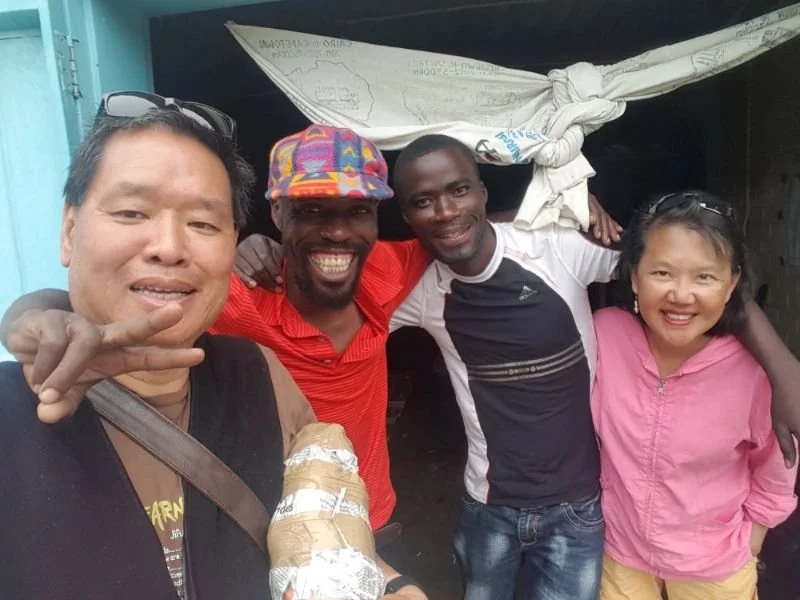Evidence Not Seen
Darlene upon arriving in Indonesia
Darlene after leaving the camp, 8 years later
Recently, in the All Nations Book Club, we read about Darlene Deibler Rose. She was a missionary to New Guinea who first arrived there just before World War II began. The book highlighted her internal spirituality more than her missionary outreach activities, but as someone in our book discussion commented: good missions comes from good personal spirituality, a moment by moment relationship with Jesus.
Darlene’s relationship with Jesus began when she was nine, when she and her mom attended a service conducted by a preacher they had heard on the radio. A year later, the same preacher returned to her town and conducted another service. At this second meeting he challenged the participants to become missionaries. Darlene knew he didn’t intend the challenge for someone as young as her. However, at the moment of the challenge, she felt a physical tap on her shoulder but saw no one. She knew then that she was called by more than just the preacher.
When Darlene graduated from high school, she began studies to help prepare her for the mission field. At this point she met Russell Deibler, a missionary on furlough from Borneo who was twelve years her senior. They felt a clear call to marry and go together to the mission field in New Guinea. Marry they did, when she was nineteen, and arrived in Indonesia on their first anniversary. (Indonesia was the missions headquarters for the New Guinea field at that time.)
While Russell traveled over arduous trails to make contact with a newly discovered tribe in New Guinea, Darlene worked at the missions headquarters in Indonesia. They knew the time was right for Darlene to join Russell when the tribal leaders began demanding to see a white woman - otherwise they could not believe the white men were not just spirits! Darlene received an enthusiastic welcome among the people, and she knew she was at home in the remote New Guinea valley.
However, soon the Dutch colonial government of Indonesia mandated that the Deiblers leave their new home, as World War II was heating up and Japanese invasion was imminent. Back at mission headquarters in Indonesia, the mission team gathered to pray and decide if they should return home or remain there. After praying individually, in order to ensure that their decision was influenced only by the Holy Spirit, each came to the same decision: They would stay. They later found out that the boat they would have left on was torpedoed and sank.
Soon thereafter, the Japanese invaded and took the men to a prison camp. As Russel was taken away to the men’s prison camp, his last words to Darlene were to remember that the Lord would never leave her or forsake her. After a period of house arrest, the women were also taken to another prison camp. The camp commander was infamous, Mr. Yamaji. He had been transferred there after killing a man at his previous camp. Even though Darlene was young, her leadership skills were evident, and she became a barracks leader, helping organize everyone in her building for daily living and their part in the camp work schedule.
Conditions in the camp were as dire as expected, with poor food and sanitation, meaningless tasks, severe beatings, rabid dogs, and more. As barracks leader, Darlene walked the line between boldly petitioning Mr. Yamaji for the needs of her people while also trying to not ask for too much and anger him. The day came when he called her to his office to tell her that Russell had died. He told her not to lose her smile, and in return, she explained the gospel and God’s love (even for him) and how it gave her hope even in the face of this terrible news. He was so affected that he left the room crying.
That night was one where Darlene’s dependence on Jesus was highlighted. In the face of the devastating loss of her husband, she intentionally leaned into Jesus, laying bare all of her feelings and concerns in a prayer vigil. This is a pattern she repeated after several other significant events as well. These prayer times gave her strength, despite the grief, to carry on and even reach out to others.
Darlene needed that strength more than ever, as she was removed from the camp and taken to a different prison run by the secret police, under suspicion of being a spy. Weeks of privations and beatings and solitary confinement exacerbated the dysentery, nutritional deficiencies, and malaria that she already had. One day she prayed and believed for healing, and she is miraculously healed. Also, she saw another prisoner outside her window with a banana, and she began to crave bananas. She prayed for the Lord to bring her one banana, but was sure there is no way God can fulfill such a request. However, soon thereafter, Mr. Yamaji visited (she later found out he had been quite concerned about her) and brought her 93 bananas.
After weeks in the prison, she was taken to the secret police headquarters to be executed. She was given a last meal and taken to a room where the agent took out his sword to behead her. Just as the execution was about to begin a car pulled up and she and two fellow American prisoners were put into it and taken back to the original camp for women. Her life had been spared. The only explanation for this she has is that “The wicked flee when no one is pursuing.” God spoke to her a lot through verses she had memorized, but she notes this was one He used even though she hadn’t specifically memorized it!
Back at the original women’s camp, she resumed her duties as barracks leader. She was even promoted to camp liaison, the spokesperson for all the prisoners with the Japanese. This promotion happened at Mr. Yamaji’s insistence, over the protests of some of the older prisoners who thought Darlene was too young. Her leadership was certainly needed more than ever as the Allies advanced and bombed the camp repeatedly, worsening conditions even more. During one bombing run, by listening to the Lord’s guidance to leave her normal bomb shelter to go back to her bed for one item, her life was spared. Soon after she left the bomb shelter to retrieve the item, the bomb shelter was directly hit. She would surely have been killed had she stayed there.
Finally VJ Day arrived and the war was over. It was bittersweet as she knew that, unlike others being united with loved ones, she would not be reunited with Russell. She was able to visit Russell’s gravesite and hear testimonies of how he ministered to his fellow prisoners in his last days. Hearing the stories of Russell’s last days helped bring closure and healing to Darlene. As she left Indonesia to return to her family in America, she was overwhelmed by feelings of bitterness. However, after some earnest prayer, she found peace and knew she would return to New Guinea. And, within a few years she does return to the area. This time she was remarried to another missionary, and together they ministered for 30 years in the land she loved.
And what about the rest of the story for Mr. Yamaji? He was sentenced to death for killing the man at the camp he had worked at previous to the women’s camp. Partly due to Darlene’s testimony of his concern while she was in prison, the sentence was commuted to a life sentence and then even that was subsequently shortened. In the 1980’s, Darlene heard through a friend of a friend about a bicycle shop owner in Japan who spoke Indonesian because he had been a camp commander there. He said if any message from him should reach the women who had been in the camp, it should be that he was sorry for being so cruel and that he was a different man now.
Looking back on the story, I can see various techniques that Darlene used to maintain her connection with Jesus, even during difficult circumstances. Most importantly, she prayed honestly and earnestly. She was not afraid to lift up bad feelings, or to spend a lot of time in prayer, or to pray for seemingly small things. Her prayer was based in Scripture – she spent consistent time in the Word, and even more intentionally she memorized parts of the Bible. She also memorized Scripture-based poems and songs. Finally, there was often a corporate component to her prayer and Bible Study. She found great support from the fellow believers she was sharing struggles with.
I hope to be intentional in incorporating these techniques in my spiritual walk. Memorizing scripture is something especially difficult for me, but I think it is key for maintaining faith through difficult circumstances. What difficult circumstances are you walking through, and which of these techniques can you grab on to as a rudder?
About the Author: Erin Duncan is a volunteer with All Nations International. She is on the journey to learning her role as a member of Christ’s body and as a gospel-bearer. In addition to these roles, she is a wife, dog mom, paralegal, and coffee shop connoisseur.
Get Connected & Let’s Grow Together!
We invite you! Here are some amazing resources you may find interesting including:
Lessons from the Least, the Last, and the Lost, All Nations Weekly Devotion by Blake Staton, M.Div.
All Nations Pocket Guide to Church Planting by Dr. Pam Arlund (in many languages)
All Nations Storytelling Resource
Mission’s Edge, a monthly roundtable learning opportunities with ministry and missions leaders! Sign-up for any of these today and participate! Let’s grow together!
To receive All Nations International leadership updates (including International Executive Leader Dr. Mary Ho’s monthly emails) and prayer needs, link HERE.
To participate or learn about our monthly global prayer for the neglected people around the world, sign-up HERE. We meet on the last Thursday of each month at 8 am CST (US). We encourage everyone to join in as we pray that Jesus will be worshiped by all peoples of the earth — the least, the last, and the lost! Register HERE to receive a monthly video prayer invite.











